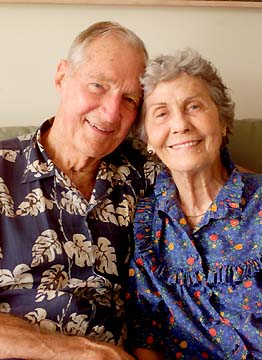
DENNIS ODA / DODA@STARBULLETIN.COM
Bill Paty, shown with his wife of 58 years, Peggy, is off to France to meet a woman who helped him after he parachuted into Normandy on D-Day, June 6, 1944.
Vet heads for reunion
with ‘D-Day milkmaid’The woman warned the Hawaii
man of approaching Germans
After parachuting into Normandy on D-Day, a young Army captain from Hawaii found himself lost and turned to a 19-year-old French milkmaid for directions.
"I never thought I would see that lady again," said former Hawaii business executive Bill Paty, 82.
But next week, with the help of a Normandy farmer and amateur historian, Paty will return to the spot where he first saw Teresa Ferey milking her cow in the early morning of June 6, 1944.
Paty was a 23-year-old Army captain and led A Company, 1st Battalion, 501st Parachute Regiment, part of the 101st "Screaming Eagles" Airborne Division that was immortalized in the Steven Spielberg and Tom Hank's TV miniseries "Band of Brothers." He was among the 6,700 airborne soldiers from the 101st and the 82nd Divisions who parachuted into the Contentin peninsula.
"We jumped at midnight on June 5 into Normandy," Paty said yesterday. "Due to the heavy rocket fire we are taking, the pilots took evasive action. It's hard to fly 1,000 C-47s at low altitude over the enemy coastline at midnight without waking the German garrison."
Paty said that when his unit jumped, "we knew we were way off our drop zone, but I didn't know where."
Eight miles from their intended drop zone, the paratroopers were deep in enemy territory. "We dropped into a beehive. We were in firefights throughout the night.
"Dawn comes. This is D-Day morning. The largest armada in the history of man is now storming the beaches of Utah and Omaha. There are heavy shells from battleships offshore zooming overhead, fighter planes are buzzing around, small-arms fire everywhere.
"In the middle of all this, in this small hedgerow pasture, there was a French milkmaid milking her cow. I am with 10 other guys, and I told my sergeant, 'Wait here, and maybe I can get us a date tonight.' So I scoot over, crouch beside her and in my best Punahou French I say: 'I say, bonjour mademoiselle, je suis un American officer' or something like that, hoping she could tell me whether any Germans are nearby.
"But I got no response. She keeps her head into the flank of the cow. But I notice she is moving her head to the right. I look up, and a German squad is coming down the lane. I hightail it back and dive into the hedgerow as they open fire.
"My sergeant tells me: 'You didn't do too good, did you, Captain?'"
Paty said he has been telling this story for decades, and "out of the blue last year, I get a letter from a French farmer in Normandy asking if I was the officer who spoke to his aunt on D-Day while she was milking a cow."
Apparently, after the war farmer Thierry Ferey became a historian, Paty said, and studied airborne operations.
"He knew all the units that jumped into Normandy," Paty said. "He went through the 101st directory and got my name and address and wrote to me a year ago."
Since then the two have been corresponding, and Paty will get to meet his "D-Day milkmaid" next week.
"I am looking forward to the trip, brushing up on my Punahou French. She only speaks French, and I would probably starve if I have to depend on my French. So I have dusted off my French phrase book and have been studying it over the last 30 days."
Paty said Teresa Ferey may have suffered because of their brief encounter.
"She and another girl were taken to a church in Sainte-Mere-Eglise which the Germans were using as a collection point for the wounded and prisoners of war. I am told they were treated very badly. They might have thought she was collaborating with the enemy when they saw me talking to her."
One of the things Paty said he would like to tell her when he meets his milkmaid next week is to apologize for any problems he may have caused 59 years ago and "to thank her and her family for their support then."
Paty, now a trustee for the Mark A. Robinson Trust, was wounded a day after landing in Normandy and held for seven months with 1,200 other U.S. officers in a POW camp in Poland until his escape.
In 1999, Paty, a retired sugar company executive and former chairman of the state Board of Land & Natural Resources, was awarded the Prisoner of War medal. Since 1994 he has served as a liaison between the civilian community and the Army.
